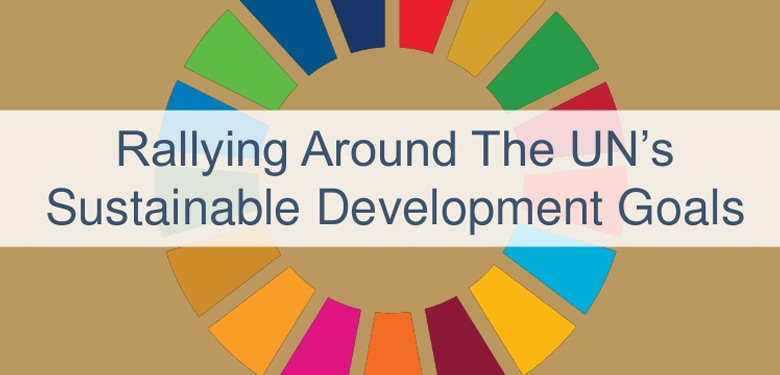
Business commitments to the SDGs are falling short – a case for government and UN leadership
Despite an increasing number of companies committing to Sustainable Development Goals (SDGs), reports by PWC and KPMG paint a bleak picture of the state of corporate reporting on the SDGS.
PWC’s “SDG Reporting Challenge 2017” is a global research project analysing the corporate and sustainability reporting of more than 470 companies from 17 countries and across six industry sectors. Its aim is to understand the SDG priorities of individual companies and the quality of reporting on prioritised goals. Similarly, the recently published KPMG study “How to report on the SDGs” reviewed the public reporting of the world’s top 250 companies by revenue across 15 industry sectors based on the Fortune Global 500 ranking of 2016.
These analyses reveal that business reporting on credible contributions to the SDGs is falling short:
- The SDGs are gaining traction among business worldwide; 75% of the companies in the KPMG study and 62% of the companies in the PWC study refer to the SDGs in their reporting. However, business strategies for engaging with the SDGs are inconsistent. Not all companies committed to the SDGs prioritise most material goals, and companies that do apply varying prioritisation methodologies. These include mapping the value chain to identify impacts, mapping SDGs to the company’s CSR activities, and incorporating them into the company’s materiality assessment process.
The value chain approach is widely used as best practice (e.g., by GRI, UNGC, WBCSD and the Gold Standard) as it allows companies to gain a complete picture of their positive and negative impacts on the SDGs and identify areas of greatest business opportunities and risks. - Goals with obvious alignment to existing business strategy and matured performance indicators predating the SDGs are most frequently prioritised by companies and include SDG13: Climate Action and SDG8: Decent Work and Economic Growth.
When prioritised SDGs focus on low-hanging fruit and fail to reflect development priorities in a company’s countries of operations, companies miss opportunities to maintain their social license to operate and to anticipate emerging national regulation. - Most companies lack a discussion of any of the 169 targets underpinning the SDGs and do not report on any performance indicators that measure progress of their SDG contributions.
These companies fail to demonstrate a meaningful and credible SDG engagement beyond aspirational commitments.
A pessimist may regard these findings as an indication of companies superficially engaging with the SDGs for reputational gains while continuing business as usual practices. An optimist might interpret these findings as companies gradually building an understanding of their specific role in achieving the SDGs amid the lack of an agreed common reporting framework, performance indicators and data necessary to operationalise the goals and underlying targets. According to UNESCAP, more than half of the 169 targets in the SDGs framework are not spelled out in quantitative terms and hence are not directly measurable.
In an “Analysis of the Goals and Targets” report by UNGC and GRI, a list of existing and established disclosures is provided, including qualitative and quantitative indictors that businesses can use to report on relevant SDG targets. A quick read of the document, which aims to build business understanding of the targets, reveals not only the vague language and aspirational (rather than quantified) nature of many targets but also the multitude of sustainability measuring frameworks that can be applied to individual targets. Under SDG6: Clean Water and Sanitation, Target 6.4 calls for “By 2030, substantially increase water-use efficiency across all sectors and ensure sustainable withdrawals and supply of freshwater to address water scarcity and substantially reduce the number of people suffering from water scarcity.” To report on this target businesses can fall back on various metrics from frameworks including inter alia GRI, CDP, CEO Water Mandate’s Corporate Water Disclosure Guidelines, World Bank WDI, or UNCTAD. Agreed common standards for measuring progress are needed to hold companies accountable to their SDG commitments.
To effectively contribute to the SDG priorities of the countries in which they operate, businesses need to connect their sustainability metrics to government metrics at national level. Multinational companies need to take a regional or global perspective that balances the varied priorities of multiple countries in which they may operation. The Measure What Matters Initiative outlines the challenges of incoherent government and business measuring frameworks using the example of fragmented water management metrics in India: business reporting frameworks focus on extraction levels, national level metrics focus on infrastructure and contextual use of water, while goals at global level emphasise access to water and sanitation.
While expectations for businesses to help achieve the SDGs are high, little progress has been made in facilitating tangible business action on the SDGs. Business guidance on how to integrate the SDGs into business strategy is rapidly evolving, but the necessary data and metrics upon which to build engagement strategies is lacking. There is a strong case for greater government and UN leadership to facilitate credible, quantified reporting on SDG contributions by businesses.
How CSR Asia can support you:
CSR Asia supports businesses at various stages of their SDG engagement process. We provide training for internal stakeholders to build understanding of what the SDGs mean for your business; we conduct benchmarking and alignment analyses to help integrate the SDGs into business strategy and assist in measuring impact and communicating progress. We convene stakeholders, work with partners in international development and produce independent research to build understanding of most relevant issues and drive best practice.